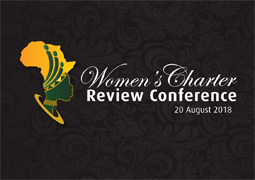
The Deputy Chairperson of the National Council of Provinces, Mr Raseriti Tau, thanked the initiative of the women’s conference that is being hosted by Parliament’s Multi-Party Women’s Caucus (MPWC) at Parliament today under the theme: “Women’s Charter review conference: Assessing progress for women since the adoption of the 1954 Women’s Charter and the 1994 Women’s Charter for effective equality”.
Addressing the conference, Mr Tau took the conference through a memory lane and contextualised the road towards the 1954 Women’s Charter. He said previously the history of women’s political organisation, their struggle for freedom from oppression, for community rights and most importantly, for gender equality, was largely ignored.
But, he said, the discovery of minerals (diamonds in Kimberley in 1867 and gold on the Witwatersrand in 1886) had unleashed huge changes in the developing South African economy, and these were to become very significant for the roles played by women, particularly black women.
He said the turning of events in the early 20th century led women to form community-based organisations. One such community organisation was the Alexandra Women’s Council (AWC) – which was established in the mid-1940s. the AWC became active in issues relating to squatter movements, and in 1947 it demonstrated against the Native Affairs Commission, which wanted to remove squatters in Alexandra township.
“The influence of trade unions began to be felt by the 1920s and it increased rapidly in the 1940s, with women such as Ray Alexander, Frances Baard and Bettie du Toit taking the lead and thus empowering the women’s movements. Early female activists such as Charlotte Maxeke, the leader of the Bantu Women’s League (BWL), also had close links with the Industrial and Commercial Workers Union,” said Mr Tau.
He reminded the conference about the United Democratic Front’s (UDF’s) Women’s Congress that was formed on 23 April 1987 by all women’s organisations that were affiliated to the UDF and included women’s cooperatives, women’s sections of youth and civic organisations, unions and church groups.
Mr Tau said the conference will serve as a launching pad to engage women across all sectors of society, on the most pertinent challenges still facing women today. These inputs will culminate in the adoption of a contextually relevant Women’s Charter in March 2019,
Mr Tau said the conference resolutions will form part of the report of the fifth Parliament that is going to be handed to the sixth one (Parliament). He emphasised the importance of processing the resolutions into policies and legislation that would accelerate the empowerment of women.
Welcoming the delegates to the conference, the Chairperson of the Multi-Party Women’s Caucus, Ms Rosalia Morotua, told the conference delegates that her committee has interacted with the South African Local Government Association women’s commission for local government elections in 2016. And as a result of that interaction, according to Ms Morotua, women’s representation in local government for the 2016 elections increased. “We are currently engaging with the IEC (Independent Electoral Commission) for review of electoral laws for provincial and national elections.”
She said they have established relations with provincial legislatures and their respective women’s caucuses and civil society organisations. “These are just some of the activities that we undertook as this fifth Parliament MPWC, taking into consideration that our members are also members of other Parliamentary Committees. We hope that the sixth Parliament MPWC would be inspired by these initiatives and move forward with them.”
By Mava Lukani
20 August 2018

